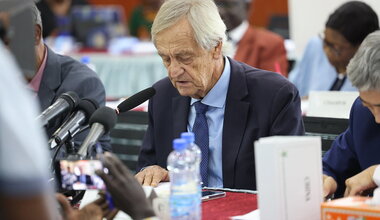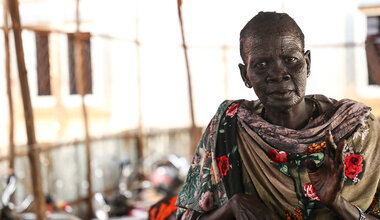Feuding Tonj East communities commit to end conflict and reconcile at Government and UNMISS-led peace dialogue
For months, diverse communities in Tonj East have been engaging in a vicious cycle of cattle raiding and revenge attacks, costing many lives, the destruction of property, and theft of livestock.
Despite intensive efforts by peace partners, the violence has persisted along with movement obstructions, which are exacerbating an already dire humanitarian situation in the region.
In another attempt to break through the conflict, the Warrap State authorities and United Nations Mission in South Sudan brought the Luacjang and Akook communities together at a dedicated dialogue session, where they committed to reconcile, end the fighting, and live together peacefully.
The discussion was open and robust.
“Roadblocks have hindered humanitarian assistance from reaching those who need it the most,” stated Aluong Ajang Chol, a representative of the Luanyjang community.
A paramount chief representing the Akook community, Chol Malok Deng, said the proliferation of illegal firearms is fueling the violence and preventing the implementation of rule of law.
“Disarmament of the youth is the best option, it will bring peace,” he said.
Participants in the peace dialogue signed a communique to end the violence and stressed the need for the government to provide early warning of potential conflict, voluntary disarmament, and special protection for women and children.
Women’s representative, Akur Bol Duop, said there was an urgent need to improve safety.
“As women, we are the ones left mourning the dead - our sons, husbands, brothers,” she said. “Currently, we are unable to farm our lands because we are afraid of being subjected to sexual assault or worse, being killed. We need protection, not just for ourselves but for the sake of our children.”
Warrap Governor, Kuol Muor Muor, emphasized the importance of opening roads to enable the free and safe movement of people and humanitarian aid, and outlined key steps for reconciliation, including the apprehension of those who commit crimes, and the establishment of traditional courts led by local chiefs.
UNMISS representatives said it was hoped that the dialogue would pave the way towards stability and unity in the region. They urged the communities to embrace peace to enable development.
“The violence is causing immense harm and driving development away from the region. Please support each other and support the Government, so that there can be a stop to this killing and peace can be secured,” urged UNMISS representative, Adewuyi Adewumi.
 UN
UN United Nations Peacekeeping
United Nations Peacekeeping





